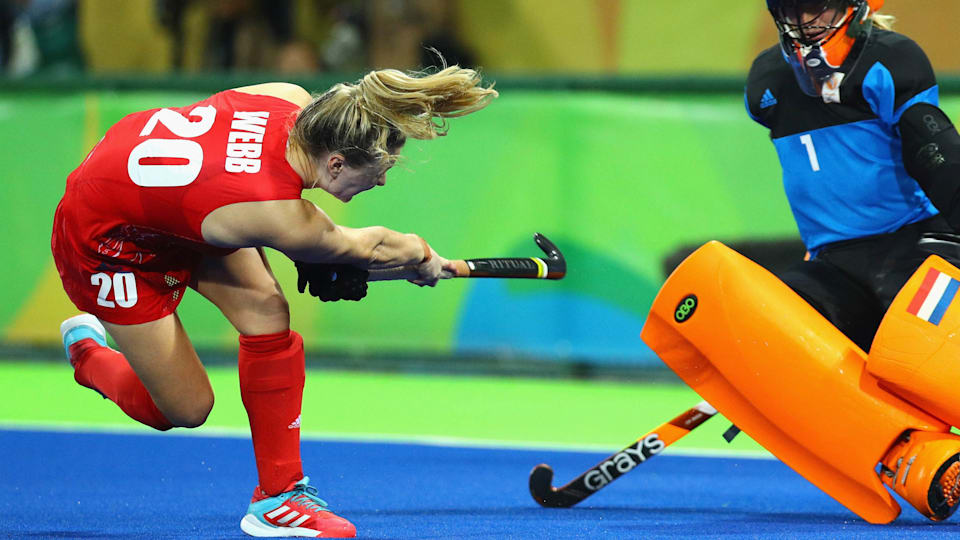Pearne-Webb focused on retaining women’s hockey title in Tokyo
She took the last, winning penalty of the final at Rio 2016, but Hollie Pearne-Webb isn’t looking back. In one of the most unpredictable women’s team sports, hockey, the Great Britain star is focused on trying to win back-to-back golds at Tokyo 2020.

Taking a penalty to win an Olympic gold medal – for both yourself and your teammates – is about as high-pressure as sporting moments can get. For Hollie Pearne-Webb, Great Britain hockey’s final shuffle penalty taker at Rio 2016, however, there were no nerves or cold sweats. Displaying the mental strength that the British side had intensely focused on developing during their preparation, she walked up to the ball to face the Netherlands’ goalkeeper feeling: “Calm. It sounds weird but I was really calm.
“I was just going through a process,” she said. “We’d done our homework as potential shuffle takers and everyone had prepared by looking at the Dutch goalie and what she did. So I knew what I was going to do. I remember telling myself to not rush, otherwise I could duff it up. I thought, ‘There’s no point being nervous. You’re just on a hockey pitch, it’s just a goal and you’ve done this so many times’.
“We had prepared in the run-up for every scenario. We had rehearsed it. That made the penalties quite simple. If the goalie had made a great save, I couldn’t control that. But it felt like forever, making sure the ball was in the net, before I turned round to celebrate.”
The wild scenes that followed revealed true emotion, however. GB had beaten the red-hot favourites, the Netherlands, who were looking to clinch their third consecutive Olympic title.
With the game finishing 3-3 at full time, the majority of pressure was suddenly on the Dutch. “Going into the final we were huge underdogs,” Pearne-Webb said. “They had that experience. They had individuals who were technically superstars. We were more reliant on being a team than on individuals.
“We had to defend for large parts of the final, they were on top for long periods. But we were putting away our opportunities to score. Because we had been hanging on, and defending really well, the momentum swung our way. I think the Dutch confidence was getting low. You could see in their body language, after the game, they couldn’t believe that they were in this situation. We were feeling excited.”
Pearne-Webb was one of many players in Rio from the England side that had defeated the Netherlands on penalties in the final of the 2015 EuroHockey Championships, and the defender said her Olympic teammates suddenly felt “confident in ourselves – it was just a case of ‘deep breath, this is fine’”.
Pearne-Webb claims she doesn’t think back to Rio much now. She is laser-focused on what lies ahead: trying to defend the title in Tokyo. “It’s a very different squad and a very different challenge,” she said. “A lot of experienced players have retired but then we’ve also gained a lot of exciting young talent. We’re in a rebuilding phase at the moment. And I think it’s harder to retain a title than win it for the first time.”
The sheer number of roughly even teams currently competing in women’s international hockey will make their defence tough, too. “Anyone can beat anyone on any given day at the moment. Yes, Holland have been winning all there is to win since the Olympics, but they’re not unbeatable. Holland lost to Australia recently, then Australia lost to Belgium. People are beating each other left, right and centre. Argentina are looking strong, and then there’s New Zealand, China, Germany.”
Some lessons from Rio 2016 can help Team GB on their way, however. “We had a real mixture of players in the squad,” Pearne-Webb said, “and it was the strength of the squad – not the team – that was the biggest reason that we succeeded. There were 31 girls that trained together for four years, and competition was so high because we all wanted to be on the plane.
“Everyone was pushing one another. You also wanted to get your teammate to become better because that’d force you to improve, too. We created a ‘team first’ culture that worked. Every session and minute mattered. It gelled us together. And the mental strength and resilience that came with that was a massive part of why we did so well.”
The players even decided to enforce a social media shutdown to prevent distractions. “We had no idea what was going on back home,” Pearne-Webb said. “We decided as a squad that we wouldn’t use social media – because if any tiny comment could affect just one player on one day, we didn’t want that risk. It meant we had no idea what was going on back home. When we turned our phones on at the end, they were crashing from so many messages. We’d united the nation, so many people had been watching us. It gives you goosebumps.”
It’s a feeling Pearne-Webb is desperate to recreate in Tokyo. “I’m so excited for it. I remember standing on the pitch in Rio and thinking, ‘I definitely want to do this again’. We just want to qualify, and then you want to make it into that team. It’s a huge goal that motivates me every day when I get up.”
Pearne-Webb combines training with a high-flying accountancy job for the British government’s Department for Environment, Food and Rural Affairs. “It is hard and it means I have to be organised,” she admitted. “If I’m not training, then I’m in the office. But it has a massive positive benefit because it gives me something else to focus on. I’m an over-thinker. If I wasn’t at work I’d be thinking about mistakes I’d made.”
